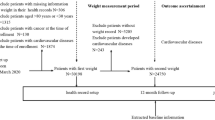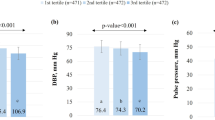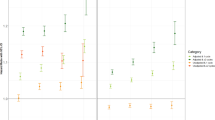Abstract
Although quitting smoking lowers the risk of developing chronic conditions, it usually leads to weight gain. Literature on the association between weight gain after quitting smoking and the future development of hypertension is scarce. Among 234 596 individuals who visited our health center, 856 who had quit smoking for whom data were available at least 6 years after smoking cessation were included. We evaluated changes in blood pressure and antihypertensive drug prescription rate at 1 and 6 years after smoking cessation. We also compared weight and blood pressure between the smoking cessation and continued smoking groups after 6 years. Multiple regression analyses were performed to identify predictors of changes in systolic and diastolic blood pressures using covariates affecting blood pressure. Since a median weight gain of 1.8 kg was observed at 1 year after smoking cessation, we divided the participants into high and low-weight gain groups. No significant intergroup difference in the antihypertensive drug prescription rate was observed after 6 years. The high weight gain group showed significant increases in systolic and diastolic blood pressures after 6 years. Multiple regression analyses revealed that systolic blood pressure was affected by age and high weight gain, while diastolic blood pressure was affected by high weight gain. Our findings suggest that weight gain following smoking cessation leads to blood pressure elevation: the smoking cessation group gained more weight and had higher blood pressure than the continued smoking group. Therefore, weight loss guidance may be useful for individuals who want to quit smoking.

Participants in the high weight gain group showed significant increases in systolic and diastolic blood pressures at 6 years after smoking cessation that were significantly different from those observed in participants in the low weight gain group and the continued smoking group.
This is a preview of subscription content, access via your institution
Access options
Subscribe to this journal
Receive 12 print issues and online access
$259.00 per year
only $21.58 per issue
Buy this article
- Purchase on Springer Link
- Instant access to full article PDF
Prices may be subject to local taxes which are calculated during checkout




Similar content being viewed by others
References
Pirie K, Peto R, Reeves GK, Green J, Beral V, Million Women Study Collaborators. The 21st century hazards of smoking and benefits of stopping: a prospective study of one million women in the UK. Lancet. 2013;381:133–41.
Strandberg AY, Strandberg TE, Pitkala K, Salomaa VV, Tilvis RS, Miettinen TA. The effect of smoking in midlife on health-related quality of life in old age: a 26-year prospective study. Arch Intern Med. 2008;168:1968–74.
Mulder I, Tijhuis M, Smit HA, Kromhout D. Smoking cessation and quality of life: the effect of amount of smoking and time since quitting. Prev Med. 2001;33:653–60.
Perkins KA. Weight gain following smoking cessation. J Consult Clin Psychol. 1993;61:768.
Henningfield JE, London ED, Pogun S Handbook of Experimental Pharmacology: Preface. In Henningfield JE, London ED, Pogun S (eds), Handbook of Experimental Pharmacology, 2009 192, Nicotine Psychopharmacology. Springer-Verlag: Berlin Heidelberg, Germany, v–viii.
Filozof C, Fernandez Pinilla MC, Fernández‐Cruz A. Smoking cessation and weight gain. Obes Rev. 2004;5:95–103.
Hughes JR. Effects of abstinence from tobacco: etiology, animal models, epidemiology, and significance: a subjective review. Nicotine Tob Res. 2007;9:329–39.
Hughes JR, Gust SW, Skoog K, Keenan RM, Fenwick JW. Symptoms of tobacco withdrawal: a replication and extension. Arch Gen Psychiatry. 1991;48:52–9.
Gritz ER, Ippoliti A, Jarvik ME, Rose JE, Shiffman S, Harrison A, et al. The effect of nicotine on the delay of gastric emptying. Aliment Pharm Ther. 1988;2:173–8.
Miller G, Palmer KR, Smith B, Ferrington C, Merrick MV. Smoking delays gastric emptying of solids. Gut. 1989;30:50–3.
Kadota K, Takeshima F, Inoue K, Takamori KI, Yoshioka S, Nakayama S, et al. Effects of smoking cessation on gastric emptying in smokers. J Clin Gastroenterol. 2010;44:e71–5.
Hu Y, Zong G, Liu G, Wang M, Rosner B, Pan A, et al. Smoking cessation, weight change, type 2 diabetes, and mortality. N. Engl J Med. 2018;379:7.
Clair C, Rigotti NA, Porneala B, Fox CS, D’Agostino RB, Pencina MJ, et al. Association of smoking cessation and weight change with cardiovascular disease among adults with and without diabetes. JAMA. 2013;309:1014–21.
Kim K, Park SM, Lee K. Weight gain after smoking cessation does not modify its protective effect on myocardial infarction and stroke: evidence from a cohort study of men. Eur Heart J. 2018;39:1523–31.
Di Angelantonio E, Bhupathiraju SN, Wormser D, Gao P, Kaptoge S, de Gonzalez AB, et al. Body-mass index and all-cause mortality: individual-participant-data meta-analysis of 239 prospective studies in four continents. Lancet. 2016;388:776–86.
Dudina A, Cooney MT, Bacquer DD, Backer GD, Ducimetière P, Jousilahti P, et al. Relationships between body mass index, cardiovascular mortality, and risk factors: a report from the SCORE investigators. Eur J Cardiovasc Prev Rehabil. 2011;18:731–42.
Sim WY, Cho YG, Kang JH, Park HA, Kim KW, Im Hur Y, et al. The relationship between smoking and unhealthy weight control behaviors among Korean adolescents: The tenth Korea youth risk behavior web-based survey, 2014. Korean J Fam Med. 2017;38:28.
Ikeda N, Saito E, Kondo N, Inoue M, Ikeda S, Satoh T, et al. What has made the population of Japan healthy? Lancet. 2011;378:1094–105.
Tian J, Venn A, Otahal P, Gall S. The association between quitting smoking and weight gain: a systematic review and meta-analysis of prospective cohort studies. Obes Rev. 2015;16:883–901.
Veldheer S, Yingst J, Zhu J, Foulds J. Ten-year weight gain in smokers who quit, smokers who continued smoking and never smokers in the United States, NHANES 2003-2012. Int J Obes (Lond). 2015;39:1727–32.
Sharma A. Smoking cessation and changes in body mass index among middle-aged and older adults. J Appl Gerontol. 2018;37:1012–36.
Aubin H-J, Farley A, Lycett D, Lahmek P, Aveyard P. Weight gain in smokers after quitting cigarettes: meta-analysis. BMJ. 2012;345:e4439.
Bush T, Lovejoy JC, Deprey M, Carpenter KM. The effect of tobacco cessation on weight gain, obesity, and diabetes risk. Obesity. 2016;24:1834–41.
Eisenberg D, Quinn BC. Estimating the effect of smoking cessation on weight gain: an instrumental variable approach. Health Serv Res. 2006;41:2255–66.
Choi JW, Kim TH, Han E. Smoking cessation, weight change, diabetes, and hypertension in Korean adults. Am J Prev Med. 2021;60:205–12.
Acknowledgements
Editorial support, in the form of medical writing, assembling tables, and creating high-resolution images based on the authors’ detailed directions; collating author comments; copyediting; fact checking; and referencing was provided by Editage, Cactus Communications.
Funding
This research did not receive any specific grant from funding agencies in the public, commercial, or not-for-profit sectors.
Author information
Authors and Affiliations
Corresponding author
Ethics declarations
Conflict of interest
The authors declare no competing interests.
Additional information
Publisher’s note Springer Nature remains neutral with regard to jurisdictional claims in published maps and institutional affiliations.
Supplementary information
Rights and permissions
Springer Nature or its licensor (e.g. a society or other partner) holds exclusive rights to this article under a publishing agreement with the author(s) or other rightsholder(s); author self-archiving of the accepted manuscript version of this article is solely governed by the terms of such publishing agreement and applicable law.
About this article
Cite this article
Ninomiya, Y., Kawasoe, S., Kubozono, T. et al. Association between weight gain following smoking cessation and development of hypertension in the future. Hypertens Res 47, 1167–1174 (2024). https://doi.org/10.1038/s41440-023-01549-8
Received:
Revised:
Accepted:
Published:
Issue Date:
DOI: https://doi.org/10.1038/s41440-023-01549-8



